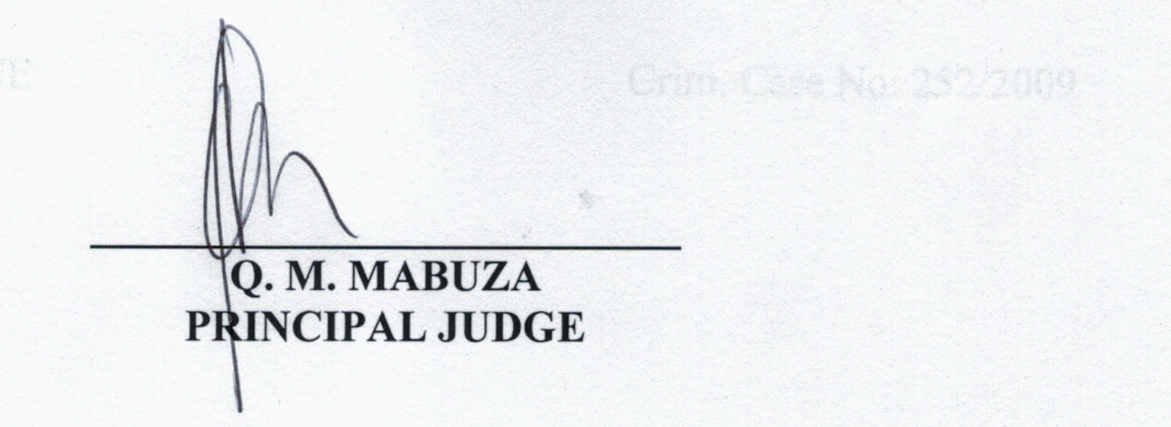
IN THE HIGH COURT OF SWAZILAND
HELD AT MBABANE CASE NO. 1001/17
In the matter between:
THABSILE THANDEKA KHOZA APPLICANT
and
KHANYISILE BONISIWE MAKHANYA 1ST RESPONDENT
MFANZILE MICHAEL SUKATI 2ND RESPONDENT
SIPHIWE ALICE HLOPHE 3RD RESPONDENT
ESTATE LATE JOICE SISANA DLAMINI 4TH RESPONDENT
THE MASTER OF THE HIGH COURT 5TH RESPONDENT
THE ATTORNEY GENERAL 6TH RESPONDENT
Neutral Citation : Thabsile Thandeka Khoza v Khanyisil Makhanya and
5 Others (1001/17) [2018] SZHC 10 (13 FEBRUARY 2018)
Coram : MABUZA – PJ
Heard : 1 DECEMBER 2017
Delivered : 13 FEBRUARY 2018
SUMMARY
Civil Law – Administration of Estates – Applicant suing nominee Executor – Letters of Administration not issued – Held until an executor has been appointed and Letters of Administration have been taken out, the estate cannot sue or be sued – Application dismissed with costs.
JUDGMENT
MABUZA -PJ
[1] In this matter the Applicant seeks an order in the following terms:
(a) Directing that the 1st and 5th Respondents facilitate and give effect to
the transfer of immovable property Lot No. 1661, Mbabane Township, Extension 13 into the names of the Applicant and 1st to Third Respondents within 30 days of grant of this order.
(b) Directing that the 1st Respondent gives a full account of money received as rental income from the period of July 2008 to June 2017 in respect of the leasing of immovable property Lot No. 1661, Mbabane Township, Extension 13 within fourteen (14) days of this order.
(c) Directing that the 1st Respondent pay to the Applicant a quarter (1/4) share of all monthly rental income received as rental income from the period of July 2008 to July 2017 in respect of the leasing of immovable property Lot No. 1661, Mbabane Township, Extension 13 within Seven (7) days of filing of the rental account.
(d) Directing that the 1st Respondent immediately pay to the Applicant a quarter (1/4) share of all monthly rental income received from the leasing out of immovable property Lot No. 1661, Mbabane Township, Extension 13 on a monthly basis effective from the end of July 2017.
[2] The application is opposed by the 1st and 2nd Respondents. Condonation for the late filing of the answering affidavit is hereby granted.
Background
[3] The Applicant, 1st, 2nd, and 3rd Respondents are siblings. Their biological mother is Joice Sisana Dlamini who passed away on the 16th July 2000.
[4] The only asset in her estate is certain immovable property described as Lot No. 1661, Mbabane Township, Extension 13. The deceased purchased this property from the Government of Swaziland and at her death had not obtained registration transfer.
[5] The deceased’s estate was reported during 2006 to the Master of the High Court and was allocated estate number EM 4000/2006 and the 1st Respondent was nominated Executrix Dative.
[6] The 1st Respondent has raised the following points of law:
(a) The Applicants’ lack of locust standi;
(b) No locus standi to be cited;
(c) Applicant’s lack of standi to direct the 1st and 5th Respondents to
facilitate transfer; and the
(d) Applicants lack of standi to demand an accounting or share of rent.
[7] In Klempman N.O. v Law Union and Rock Insurance Co. Ltd. (head note) it is stated:
“An executor or executrix testamentary has no locus standi as a representative of an estate unless and until he or she actually receives letters of administration in terms of section 32 of Act 24 of 1913. The fact of nomination in the will may confer a right to demand an appointment from the Master but in itself it does not confer any authority to deal with or intermeddle in the estate. Nor does the fact of nomination by itself constitute such a person a representative of the estate to receive notices to the estate as a whole, e.g. from an insurance company cancelling a fire policy issued in favour of the deceased”.
[8] Section 32 of Act 24 of 1913 (South Africa) is similar to section 22 of the Swaziland Administration of Estates Act No. 28 of 1902 (the Act) provides that:
“The estates of all persons dying either testate or intestate shall be administered and distributed according to law under letters of administration to be granted in the form contained in Schedule “B”, by the Master to the testamentary executors duly appointed by such deceased persons, or to such persons who are in default of testamentary executors appointed executors dative in terms of this Act”.
Section 24 of the Act sets out the procedure as to how an Executor Dative is appointed.
[9] The report by the 5th Respondent (the report) at paragraph 2 states that the 1st Respondent was appointed Executrix Dative on the 19th September 2006 in accordance with the requirements of section 24 (1) of Act 28/1902. A reading of the section cited clearly states that the notice in the gazettee calling upon next of kin, legatees and creditors of the deceased to attend at his office “to see letters of administration granted to such person as shall be appointed by him, executor of the estate of such deceased person…”.
[10] The report has certain anomalies which I tabulate below:
(a) The report of the 5th Respondent fails to explain why Letters of Administration were not issued to the 1st Respondent.
(b) At paragraph 3, the report cites section 51 (2) of the Act which refers to issuance of Letters of Administration but the report is silent as why the Letters of Administration were not filed of record.
(c) At paragraph 4 of the report reference is made to Annexure “MHC 2”, which is a letter addressed to the National Housing Board from the Master’s office. Even though the report states that this letter was written for the 1st Respondent, it does not reveal her status as the Dative nor are Letters of Administration in her favour attached to enable the Swaziland National Housing Board to begin the process of registration of transfer to the four beneficiaries.
(d) Normally there are requirements that a nominee has to fulfil before Letters of Administration are issued. The report does not state whether or not the 1st Respondent was directed to comply with these or not. The 5th Respondent does not state in the report why she did not issue Letters of Administration in favour of the 1st Respondent.
[11] It is trite that: “Until an executor has been appointed and letters of administration have been taken out, the estate cannot sue or be sued”, per Farlam, Fichar at and van Loggenberg The Superior court Practice B1 – 1260 (authorities cited at note 4; and at page 107 note 85) and also Meyerowitz on The Law and Practice of Administration of Estates 4th ed.
[12] In Krige and Others vs Scoble and Others 1912 TPD 814 at 817, 819 - 820 Wessels J stated:
“Gradually however, the executor usurped the powers of the heir and during the eighteenth century it became customary for the executor testamentary to be recognized as the conduit pipe through whom the heirs obtained what they were entitled to.
It is clear … that the whole estate vests in the executor. The executor, whether testamentary, dative or assumed, is the only person recognized by this Court … So also for purposes of passing transfer of land or making delivery of movables belonging to the estate of a deceased person, the executor and not the heir is acknowledged by this Court.
If then, the estate vests in the executor dative, can the heir bring a vindicatory action against a third party without the aid of an executor? If such an action could be brought, the court would have to enquire who really are the heirs ab intestatio, and then to declare that the Plaintiffs as heirs are entitled to the property.
Yet according to law, the heirs cannot obtain the property, because they can only become the owners of it through the executor dative; therefore we would by such declaration, violate the law. Therefore, all that the court could do is to declare that if there were an executor dative, he would be entitled to the property. In other words, the court would have to give a declaration of rights in favour of one who is not before Court. This shows what an absurd conclusion we should arrive at unless we adopt the view that the whole estate of the deceased vests in the executor dative. It the estate vests in the executor dative it is clear that the heirs have no right to institute the action as they have done, and that we ought to have before us the executor dative. The exception is, therefore, good, and must be upheld with costs”.
[13] Similarly no person can institute proceedings on behalf of the estate except the executor [1950] (1) SA at 15. As stated by Barry J in Estate Hughes vs Fouche:
“Mr. Curlewis, on behalf of the Defendant, has taken a preliminary point; he says that the proper Plaintiff is not before Court. I think that the preliminary point should succeed. It seems to me a point of substance and not a technical point. The usual way in which an estate sues or is sued is through the executors, and the summons and pleadings allege who the executors are, what kind of executors they are and when the letters of administration were issued to them”.
[14] Initially I was sympathetic with the Applicant for being in the dark with regard to how much rent her mother’s property was generating or how it was used. But after perusing the authorities I must agree with Mr. Mamba, counsel for the 1st and 2nd Respondents.
[15] In the result it is hereby ordered:
(a) that the 5th Respondent immediately issues Letters of Administration in favour of the 1st Respondent.
(b) that the points of law are upheld and the application is dismissed with costs.

For the Applicant : Mr. F.M. Tengbeh
For the 1st and 2nd Respondents : Mr. L.R. Mamba
9